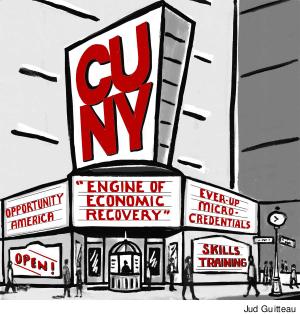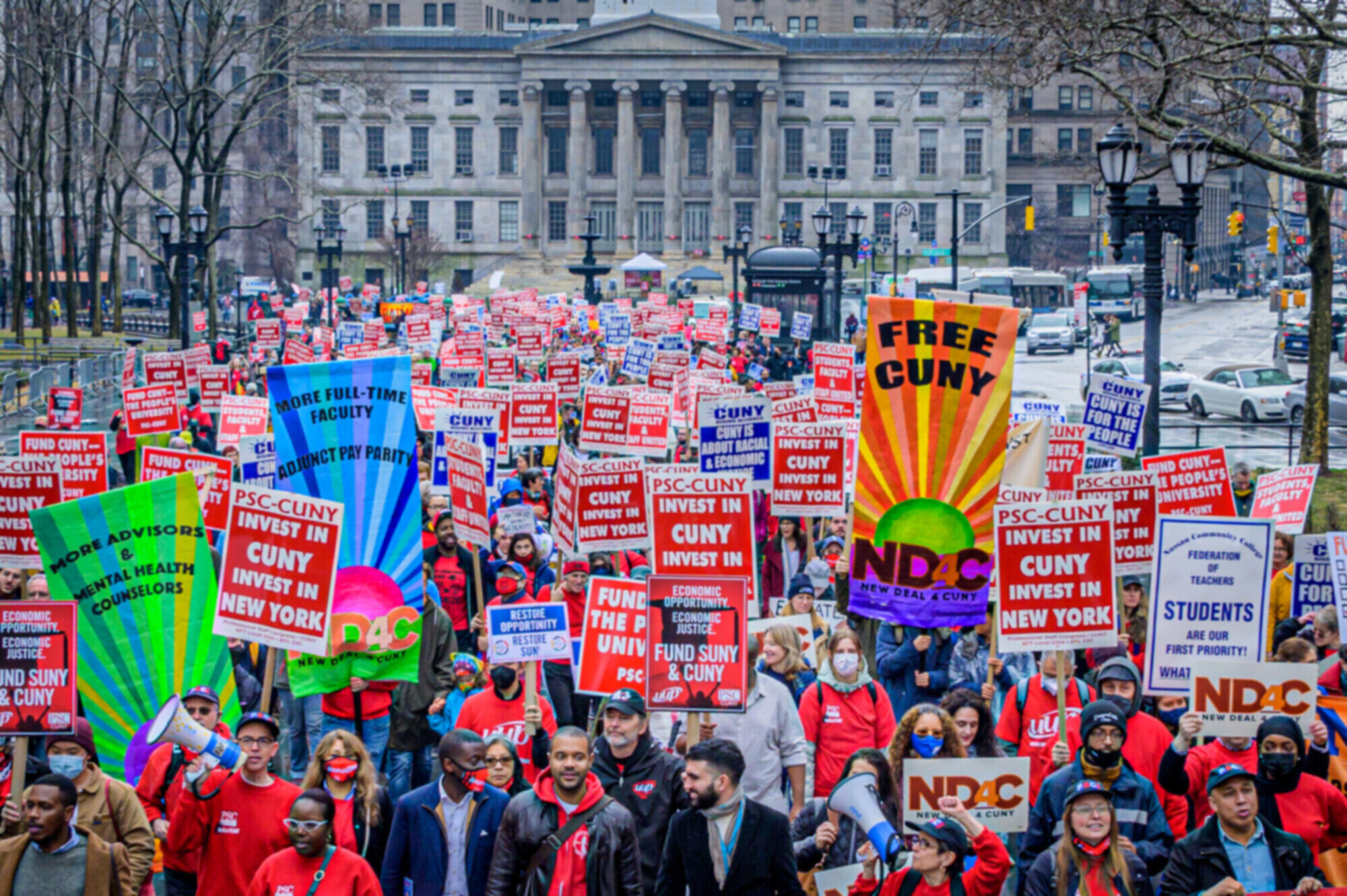View from Bronx Community College

In July 2020, Tamar Jacoby, head of Opportunity America (OA), a think tank that reenvisions the American community college system as sites for skills training where students earn micro-credentials rather than traditional degrees, held a virtual conference called “Skills Wanted: CUNY as an Engine of Economic Recovery,” attended by the CUNY chancellor, the presidents of Bronx Community and LaGuardia Community colleges and five New York City employment institutes. What the OA’s picture of neoliberal reform fails to fully paint is the fact that for institutions like CUNY, this means professors and their teaching could be pushed to the side in favor of more lucrative short-term, training courses, funded by corporations or (potentially) Pell Grants.
Texas State Technical College (TSTC) was offered up as a shining example of this approach in OA’s working paper “The Indispensable Institution,” cowritten with LaGuardia Community College President Kenneth Adams and others. Under OA’s guidance, TSTC’s programs were evaluated on student employment outcomes and 13 programs were closed, instructors were “repositioned,” and students who wanted “closed majors” – i.e., humanities courses that do not fit discrete job titles like “airline mechanic” or “retail” training – were offered incentives to switch. OA touts that “virtually every decision – about instruction, but also advising and student supports – is now made with an eye to the new bottom line.”
As professors at CUNY, we hear students asking, “What’s so bad about a job waiting for me after graduation?” OA leverages this thinking to gain more traction at our university. If corporate-designed, workforce-training programs become the path of least resistance because they’re fast and free, a majority of community college students can be channeled there.
In this model, what happens to those students who understand the value of a humanities degree, but who need extra support before matriculating at a four-year college? Bronx Community College (BCC) is a designated minority-serving and Hispanic-serving institution, which means that federal dollars are meant to ensure our students get a liberal arts education. In OA’s model, almost all of our students of color would be pushed out of a humanities education, reifying classism and racism in the process.
Jacoby is a former fellow at the Manhattan Institute, a conservative think tank that opposes public-sector unions like the PSC that advocate for robust funding for CUNY. Can CUNY really risk collaborating with someone with this kind of background? OA defines equality as equal access to job placement programs. But a job is not the only requirement for equality. While BCC students are funneled into a quick micro-credential program, students who can enter directly into a four-year college will be working on complex professional careers. Students who require additional support to succeed in an academic degree would be edged out.
OA is already influencing CUNY policy. Last summer, Jacoby, speaking on a podcast said,“OA is independent from CUNY,” but nonetheless is “writing a consultant report for CUNY… a road map if [CUNY] want[s] to go in this direction.” Just this April, a CUNY-wide email from the chancellor encouraged students to consider programs like CUNY Upskilling (a partnership with Coursera) or the EverUp Micro-Credential Program.
CUTS
At BCC, besides the not-so-new practice of borrowing neoliberal rhetoric to talk about education, we are starting to see a number of disturbing decisions. In our English department, the developmental writing coordinators and the ESL writing coordinators were cut, and some contingent faculty were not rehired.
Our writing center was replaced with tutor.com. Across campuses, class size is increasing. This is on top of eliminating remediation classes, entrance exams, and many summer and auxiliary programs designed to help our most academically disadvantaged students. System changes, such as these, can create a void for ideologues to dismantle the traditional humanities education.
The humanities are not just flowery literature and bleeding-heart social services. The humanities teach our students to think critically about our ethical behavior in all professions. It is an important check and balance that allows us to develop Pulitzer Prize-winning programs like the 1619 Project, the Black Lives Matter movement, poems like those of Amanda Gorman or the social programs that fed schoolchildren in Spanish Harlem in the 1970s. The humanities are not a luxury. They are an absolute necessity alongside all other kinds of learning. If we choose to ignore that, we are no different than those who are trying to ban critical race theory studies or the literature of Black and Latinx writers. As professors, it is our duty to teach and enlighten, we most hold the line against those who would change the very fabric of what. We have been charged to do as minority-serving and Hispanic-serving institutions; our students demand it.
The OA Research Group is a group of concerned faculty and staff based at Bronx Community College. You can contact the group at [email protected].

